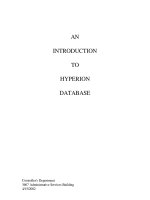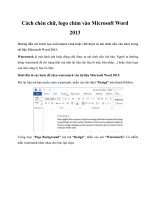Introduction Microsoft Training & Certification potx
Bạn đang xem bản rút gọn của tài liệu. Xem và tải ngay bản đầy đủ của tài liệu tại đây (1.24 MB, 14 trang )
Contents
Introduction 1
Course Materials 2
Prerequisites 3
Course Outline 4
Initial Logon Procedure 6
Microsoft Official Curriculum 7
Microsoft Certified Professional Program 8
Facilities 10
Introduction
Information in this document, including URL and other Internet Web site references, is subject to
change without notice. Unless otherwise noted, the example companies, organizations, products,
domain names, e-mail addresses, logos, people, places, and events depicted herein are fictitious,
and no association with any real company, organization, product, domain name, e-mail address,
logo, person, place or event is intended or should be inferred. Complying with all applicable
copyright laws is the responsibility of the user. Without limiting the rights under copyright, no
part of this document may be reproduced, stored in or introduced into a retrieval system, or
transmitted in any form or by any means (electronic, mechanical, photocopying, recording, or
otherwise), or for any purpose, without the express written permission of Microsoft Corporation.
Microsoft may have patents, patent applications, trademarks, copyrights, or other intellectual
property rights covering subject matter in this document. Except as expressly provided in any
written license agreement from Microsoft, the furnishing of this document does not give you any
license to these patents, trademarks, copyrights, or other intellectual property.
2003 Microsoft Corporation. All rights reserved.
Microsoft, MS-DOS, Windows, Windows NT, ActiveX, Active Directory, MSDN, PowerPoint,
and Windows Media are either registered trademarks or trademarks of Microsoft Corporation in
the United States and/or other countries.
The names of actual companies and products mentioned herein may be the trademarks of their
respective owners.
Introduction iii
Instructor Notes
The Introduction module provides students with an overview of the course
content, materials, and logistics for Course 2285, Installing, Administering, and
Configuring Microsoft Windows XP Professional.
You need the Delivery Guide and Trainer Materials compact disc to teach this
course.
To prepare for this course, you must complete the Course Preparation Checklist
that is included with the trainer course materials.
Module Strategy
This section contains information that will help you to teach this module.
! Course 2285A: Installing, Administering, and Configuring Microsoft
Windows XP Professional.
Show the slide that displays the course number and title.
! Introduction
Welcome students to the course and introduce yourself. Provide a brief
overview of your background to establish credibility.
Have students introduce themselves and provide their background, product
experience, and expectations of the course.
Record student expectations on a whiteboard or flipchart to which you can
refer later in class.
! Course materials
Explain the purpose of all the materials used in this course.
! Prerequisites
Provide students with the list of prerequisites that they should have met
before taking this course. This is an opportunity for you to identify students
who may not have the appropriate background or experience to attend this
course.
! Course outline
Provide an overview of each module and what students will learn.
Explain how this course will meet students’ expectations by relating the
information that is presented in individual modules to their expectations.
! Setup
Provide the students with any necessary setup information for the course.
Presentation:
30 minutes
Required materials
Preparation tasks
iv Introduction
! Microsoft Official Curriculum
Present an overview of the Microsoft
® Official Curriculum (MOC) program,
present the list of recommended courses, and refer students to the Microsoft
Official Curriculum Web page at
! Microsoft Certified Professional program
Inform students about the Microsoft Certified Professional (MCP) program,
any certification exams that are related to this course, and the various
certification options.
! Facilities
Explain the facility information for the training site.
Introduction 1
Introduction
*****************************
ILLEGAL FOR NON-TRAINER USE******************************
2 Introduction
Course Materials
*****************************
ILLEGAL FOR NON-TRAINER USE******************************
The following materials are included with your kit:
! Name card. Write your name on both sides of the name card.
! Student workbook. The student workbook contains the material presented in
class in addition to the hands-on lab exercises.
! Student Materials compact disc. The Student Materials compact disc
contains the Web page that provides you with the links to resources
pertaining to this course, including additional readings, review and lab
answers, lab files, multimedia presentations, and course-related Web sites.
To open the Web page, insert the Student Materials compact disc into
the CD-ROM drive, and then at the root directory of the compact disc,
double-click Autorun.exe or Default.htm.
! Course evaluation. To provide feedback about the course, training facility,
and instructor, you will have the opportunity to complete an online
evaluation near the end of the course.
To provide additional comments or inquire about the Microsoft Certified
Professional (MCP) program, send e-mail to
.
Note
Introduction 3
Prerequisites
*****************************
ILLEGAL FOR NON-TRAINER USE******************************
This course is designed for administrators who are responsible for
implementing, administering, and configuring the Microsoft Windows
® XP
Professional client. Additional information for Windows 2000 is also included
explaining how it differs from Windows XP Professional.
This course provides the basic knowledge that IT professionals need to install,
administer, and configure Windows clients operating in a Windows
Server 2003 network environment.
This course requires that you meet the following prerequisites:
! CompTIA A+ certification or equivalent knowledge
! CompTIA Network+ certification or equivalent knowledge
! Course 2208A: Upgrading Your Skills from Microsoft Windows NT to
Microsoft Windows Server 2003
–or–
! Course 2274: Managing a Microsoft Windows Server 2003 Environment
! Course 2275: Maintaining a Microsoft Windows Server 2003 Environment
! Course 2276: Implementing a Microsoft Windows Server 2003 Network
Infrastructure: Network Hosts
! Course 2277: Implementing, Managing, and Maintaining a Microsoft
Windows Server 2003 Network Infrastructure: Network Services
4 Introduction
Course Outline
*****************************
ILLEGAL FOR NON-TRAINER USE******************************
Module 1, “Installing Windows XP Professional,” describes how to prepare for
and perform an installation of Windows XP Professional. The module also
describes how to automate an installation of Windows XP Professional by using
an answer file and a Uniqueness Database File (UDF). It also explains how to
transfer user files and settings to a new computer, and how to use an image to
install Windows XP Professional.
Module 2, “Adding Hardware to Windows XP Professional Clients,” introduces
the tasks that you need to perform to add new hardware to your computers,
update a driver, or modify your hardware configuration. The module also
describes how to disable drivers and uninstall hardware.
Module 3, “Resolving Boot Process Issues,” describes the boot process, and the
tools and techniques that you can use to identify and resolve startup issues.
Module 4, “Configuring the Desktop Environment,” introduces configuration
and customization settings for user desktops. The module explains how to use
profiles to implement and enforce desktop customization policies, and how to
use Remote Assistance to respond to requests for help.
Module 5, “Configuring Internet Explorer and Application Compatibility,”
explains how to configure security and connection settings for Internet
Explorer. The module also explains how to use the Internet Explorer
Administration kit and Group Policy to customize and deploy Internet settings.
Finally, the module describes how to use the Dr. Watson utility to troubleshoot
applications.
Introduction 5
Module 6, “Configuring Windows XP Professional to Operate in a Microsoft
Network,” explains how to correctly create and configure user accounts, and
configure the security of the network. The module also explains how to
configure computers running Windows XP Professional to operate in a
Windows workgroup or domain.
Module 7, “Configuring Windows XP Professional for Mobile Computing,”
explains how to help mobile users work more effectively by controlling the
power usage of their computers. The module also explains how to make files,
folders, and Web pages available offline.
6 Introduction
Initial Logon Procedure
*****************************
ILLEGAL FOR NON-TRAINER USE******************************
! Log on to your account
1. Press CTRL+ALT+DEL to open the Log On to Windows dialog box.
2. In the User name box, type Studentx (where x is your student number).
3. In the Password box, type P@ssw0rd
4. In the Log on to box, click NWTRADERS, and then click OK.
Tasks
Introduction 7
Microsoft Official Curriculum
*****************************
ILLEGAL FOR NON-TRAINER USE******************************
Microsoft Training and Certification develops Microsoft Official Curriculum
(MOC), including MSDN
® Training, for computer professionals who design,
develop, support, implement, or manage solutions by using Microsoft
products
and technologies. These courses provide comprehensive skills-based training in
instructor-led and online formats.
For more information, visit the Microsoft Training and Certification Web site at
Introduction
Microsoft Training and
Certification information
8 Introduction
Microsoft Certified Professional Program
*****************************
ILLEGAL FOR NON-TRAINER USE******************************
Microsoft Training and Certification offers a variety of certification credentials
for developers and IT professionals. The Microsoft Certified Professional
program is the leading certification program for validating your experience and
skills, keeping you competitive in today’s changing business environment.
The Microsoft Certified Professional program includes the following
certifications.
! MCSA on Microsoft Windows 2000
The Microsoft Certified Systems Administrator (MCSA) certification is
designed for professionals who implement, manage, and troubleshoot
existing network and system environments based on Windows 2000
platforms, including the Windows .NET Server family. Implementation
responsibilities include installing and configuring parts of the systems.
Management responsibilities include administering and supporting the
systems.
! MCSE on Windows 2000
The Microsoft Certified Systems Engineer (MCSE) credential is the premier
certification for professionals who analyze the business requirements, and
design and implement the infrastructure for business solutions based on the
Windows 2000 platform and Microsoft server software, including the
Windows .NET Server family. Implementation responsibilities include
installing, configuring, and troubleshooting network systems.
! MCAD
The Microsoft Certified Application Developer (MCAD) for Microsoft
.NET credential is appropriate for professionals who use Microsoft
technologies to develop and maintain department-level applications,
components, Web clients, desktop clients, or back-end data services. It is
also appropriate for professionals who work in teams to develop enterprise
applications. The credential includes job tasks ranging from developing to
deploying and maintaining these solutions.
Introduction
MCP certifications
Introduction 9
! MCSD
The Microsoft Certified Solution Developer (MCSD) credential is the
premier certification for professionals who design and develop leading-edge
business solutions with Microsoft development tools, technologies,
platforms, and the Microsoft Windows DNA architecture. The types of
applications that MCSDs can develop include desktop applications and
multiuser, Web-based, N-tier, and transaction-based applications. The
credential includes job tasks ranging from analyzing business requirements
to maintaining solutions.
! MCDBA on Microsoft SQL Server
™
2000
The Microsoft Certified Database Administrator (MCDBA) credential is the
premier certification for professionals who implement and administer
Microsoft SQL Server databases. The certification is appropriate for
individuals who derive physical database designs, develop logical data
models, create physical databases, create data services by using Transact-
SQL, manage and maintain databases, configure and manage security,
monitor and optimize databases, and install and configure SQL Server.
! MCP
The Microsoft Certified Professional (MCP) credential is for individuals
who have the skills to successfully implement a Microsoft product or
technology as part of a business solution in an organization. Hands-on
experience with the product is necessary to successfully achieve
certification.
! MCT
Microsoft Certified Trainers (MCTs) demonstrate the instructional and
technical skills that qualify them to deliver Microsoft Official Curriculum
through Microsoft Certified Technical Education Centers (Microsoft
CTECs).
The certification requirements differ for each certification category and are
specific to the products and job functions that are by the certification. To
become an MCP, you must pass rigorous certification exams that provide a
valid and reliable measure of technical proficiency and expertise.
See the Microsoft Training and Certification Web site at
You can also send e-mail to if you have specific
certification questions.
MOC and MSDN Training can help to develop the skills that you need to do
your job. They also complement the experience that you gain while working
with Microsoft products and technologies. However, no one-to-one correlation
exists between MOC and MSDN Training courses and MCP exams. Microsoft
does not expect or intend for the courses to be the sole preparation method for
passing MCP exams. Practical product knowledge and experience is also
necessary to pass the MCP exams.
To help prepare for the MCP exams, use the preparation guides that are
available for each exam. Each Exam Preparation Guide contains exam-specific
information, such as a list of the topics on which you will be tested. These
guides are available on the Microsoft Training and Certification Web site at
Certification
requirements
For more information
Acquiring the skills
tested b
y
an MCP exam
10 Introduction
Facilities
*****************************
ILLEGAL FOR NON-TRAINER USE******************************









